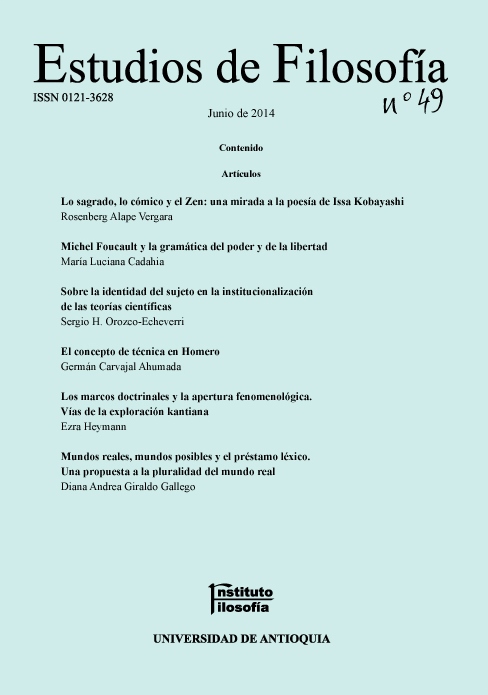Michel Foucault and the grammar of Power and Freedom
DOI:
https://doi.org/10.17533/udea.ef.19429Keywords:
Power, Freedom, Politics, ethics, Foucault.Abstract
This article asks, what the kind of conceptual relationship can be determined between the notion of power and the notion of freedom in Michel Foucault’s later work. The idea is to show that some of Foucault’s texts allow us to establish a speculative link between the two terms, understanding why they occur only in their mutual relationship and do not exist outside of it. This means, in turn, noting the limitations of those interpretations that either focus on the notion of power (biopolitics) or on the notion of freedom (aesthetics of existence). While the former leads to a too one-sided reading of the notion of power, the latter, however, disregards the political possibility that emerges from the concept of freedom. Therefore, a speculative reading that addresses both notions at once may be able to open a problematizing path to follow.
Downloads
References
AGAMBEN, G. (2004) Homo sacer II, El estado de excepción. Valencia: Pre-textos.
BENSAÏD, D. (2009) Elogio de la política profana. Barcelona: Península.
AUTOR, M. (2011) “Dos caras de una misma moneda: libertad y poder en los escritos foucaultianos”, Logos, Anales del Seminario de Metafísica 44 (2011): 165-188. DOI: https://doi.org/10.5209/rev_ASEM.2011.v44.36881
CANO, G. (2011) La vida en juego. Mayo del 68 como laboratorio biopolítico. En M. Cereceda & G. Velasco, Incomunidad. Madrid: Arena.
CUTRO, A. (2004) Michel Foucault tecnica e vita. Biopolítica e losofía del Bios. Napoli: Bibliopolis.
ESPOSITO, R. (2006) Bíos. Biopolítica y filosofía. Buenos Aires: Amorrortu.
ESPOSITO, R. (2011) Por una política de la inmanencia. Diálogo con Roberto Esposito (entrevista realizada por Gonzalo Velasco). En M. Cereceda & G. Velasco (Eds.) Incomunidad. Madrid: Arena.
FOUCAULT, M. (1999) El retorno de la moral. En Á. Gabilondo (Ed.), Michel Foucault: Estética, ética y hermenéutica (pp. 381-391). Barcelona: Paidós.
FOUCAULT, M. (1999) La ética del cuidado de uno mismo como práctica de la libertad. En Á. Gabilondo (Ed.), Michel Foucault: Estética, ética y hermenéutica (pp. 417-429). Barcelona: Paidós.
FOUCAULT, M. (2001) Sobre la genealogía de la ética. En H. Dreyfus & P. Rabinows (Eds.), Michel Foucault: Más allá del estructuralismo y la hermenéutica (pp.261-286). Buenos Aires: Nueva visión.
FOUCAULT, M. (2001) El sujeto y el poder. En H. Dreyfus & P. Rabinows (Eds.), Michel Foucault: Más allá del estructuralismo y la hermenéutica (pp.241-259). Buenos Aires: Nueva visión.
FOUCAULT, M. (2005) Vigilar y castigar. Nacimiento de la prisión. Buenos Aires: Siglo XXI.
FOUCAULT, M. (2006a) Historia de la sexualidad. Tomo I. La voluntad de Saber. Madrid: Siglo XXI.
FOUCAULT, M. (2006b) Historia de la sexualidad. Tomo II. El uso de los placeres. Buenos Aires: Siglo XXI.
FOUCAULT, M. (2010) Hay que defender la sociedad. Madrid: Akal.
HABERMAS, J. (1993) El discurso filosófico de la modernidad. Madrid: Taurus.
HADOT, P. (1990) Reflexiones sobre la noción de ‘cultivo de sí mismo’. En AA.VV., Michel Foucault, filósofo (pp. 219-226). Barcelona: Gedisa.
HADOT, P. (1995) Philosophy as a way of life: Spiritual exercises from Socrates to Foucault. Oxford: Blackewell.
HADOT, P. (2003) Historia del souci. En F. Gagin (ed.), ¿Una ética en tiempo de crisis? (pp. 219-226) Santiago de Cali: Universidad del Valle.
LÓPEZ ÁLVAREZ, P. & MUÑOZ, J (eds.) (2000) La impaciencia de la libertad. Michel Foucault y lo político. Madrid, Biblioteca Nueva.
SCHIMID, W. (2002) En busca de un nuevo arte de vivir. La pregunta por el fundamento y la nueva fundamentación de la ética en Foucault. Valencia: Pre-Textos.
ŽIŽEK, S. (2006) Órganos sin cuerpo. Sobre Deleuze y consecuencias, Valencia: Pre-textos.
Downloads
Published
How to Cite
Issue
Section
Categories
License
Copyright (c) 2014 Luciana Cadahia

This work is licensed under a Creative Commons Attribution-NonCommercial-ShareAlike 4.0 International License.
Authors who publish with this journal agree to the following terms:
1. The Author retains copyright in the Work, where the term "Work" shall include all digital objects that may result in subsequent electronic publication or distribution.
2. Upon acceptance of the Work, the author shall grant to the Publisher the right of first publication of the Work.
3. The Author shall grant to the Publisher a nonexclusive perpetual right and license to publish, archive, and make accessible the Work in whole or in part in all forms of media now or hereafter known under a Creative Commons Attribution-NoCommercia-ShareAlike (CC BY-NC-SA 4.0), or its equivalent, which, for the avoidance of doubt, allows others to copy, distribute, and transmit the Work under the following conditions: (a) Attribution: Other users must attribute the Work in the manner specified by the author as indicated on the journal Web site;(b) Noncommercial: Other users (including Publisher) may not use this Work for commercial purposes;
4. The Author is able to enter into separate, additional contractual arrangements for the nonexclusive distribution of the journal's published version of the Work (e.g., post it to an institutional repository or publish it in a book), as long as there is provided in the document an acknowledgement of its initial publication in this journal;
5. Authors are permitted, and Estudios de Filosofía promotes, to post online the preprint manuscript of the Work in institutional repositories or on their Websites prior to and during the submission process, as it can lead to productive exchanges, as well as earlier and greater citation of published work (see The Effect of Open Access). Any such posting made before acceptance and publication of the Work is expected be updated upon publication to include a reference to the Estudios de Filosofía's assigned URL to the Article and its final published version in Estudios de Filosofía.















